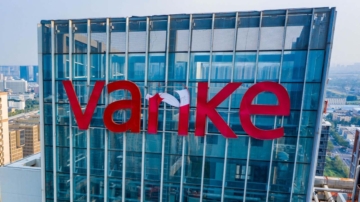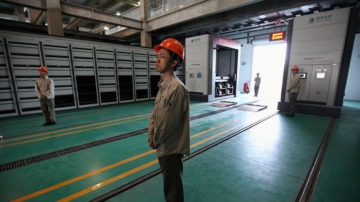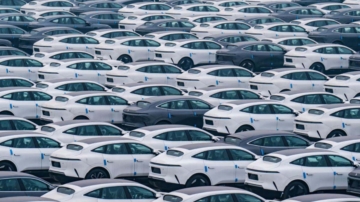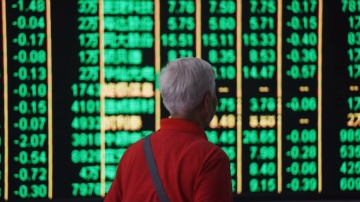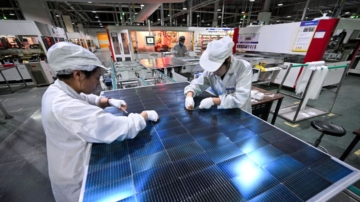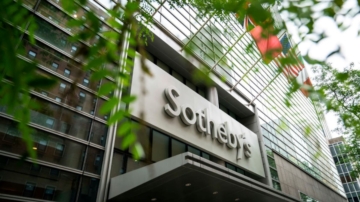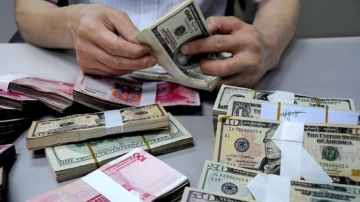【新唐人2014年06月09日讯】最近多家外媒和港媒披露,澳门赌场内有人通过非法使用中国金融服务机构“银联”的移动支付设备,规避大陆内地对货币跨境流出的限制,涉及资金数以十亿计。经济学者分析,这是应对中国房市泡沫破裂、和经济下行的风险,资本外逃的一个手段。
据香港《南华早报》报导,澳门赌场内有人为了规避大陆内地的货币管制,不惜进行非法行为,如海外洗钱、资本外逃和非法使用银行卡等,涉及资金数以十亿计,由跨境集团在国有银行系统下操作。而“银联移动支付”就是其中一种,可用于虚假交易套现,从而绕过中国政府货币控制政策。
澳门每年通过“银联卡”完成的交易数额约2000亿元人民币,其中有20%是通过移动设备完成。
在澳门街头经常能见到珠宝店的的门匾上,写着“欢迎人民币,欢迎银联卡,刷卡无上限”。
据大陆《21世纪经济报导》报导,澳门特别行政区立法会议员助理何威,实地调查非法使用“银联卡”的情况。在一家名叫“财厚押”的金店,他询问用大陆的“银联卡”最多可以刷多少,老板回答说想刷多少就刷多少,不设上限。
何威看到,店员接过来自大陆的中年妇女递过来的“银联卡”,但并没有为她取出任何商品,而是拿出80万港元现金,这名妇女在标注为“一般购物”的银联小票上签上了自己的名字,而后带着钱走向隔壁的十六浦赌场。
在澳门“新葡京”赌场内的“周大福”珠宝店,店员告诉何威,顾客可以通过刷“银联卡”,购买价值达上千万人民币的金条,然后再迅速转手卖给珠宝店,换取现金,通过这种购物方式的转换,黑钱的渠道马上变的正当。
尽管上述行为违反了中国的《反洗钱法》和资本管制规定,但在澳门,这些店铺虚假交易,刷“银联卡”以及人民币“购物”,再以其他可自由兑换的外币获得退款,并给零售商一定佣金,已经是公开的秘密了。
浙江财经大学教授谢作诗认为,资金非法流入澳门赌场,并非是简单的用于赌博,而是运作者通过这样一种方式,进行洗钱和资本外逃。并且,目前的资本外逃跟整个经济形势恶化有关系。
浙江财经大学教授谢作诗:“当然中国经济好的时候,钱是向国内大陆流。当经济形势有问题不好,它就向外流。但是我们资本项目是被管制了的。等于它一个正当的途径,流入、流出是被限制了。被限制了当然它通过一种其他的方式,比如通过赌场或者通过出口虚报数据,包括等等方式去流出。那么这个反映的问题,就是反映出中国经济泡沫,房地产泡沫,还有经济下行的风险下,一个规避套利的行为。”
浙江温州市会计唐必清也认为,资金非法流入澳门赌场,洗钱和资本外逃的可能性很大。
浙江温州市会计唐必清:“因为这个方法比较隐秘,查处的话也不好查处。”
在澳门赌场洗钱过程中,俗称“叠马仔”的博彩中介人营运商,扮演了重要角色。他们从大陆物色潜在赌客吸引到澳门后,通过放宽借贷限额的方式,使赌客们投下的赌资,得以远超法定允许出境的金额。“叠马仔”利用他们第三者的身份,将大量金钱输送到外地及各个赌场,客户一般依靠博彩中介人替他们调拨资金,这样就会很难辨别出资金的来源及客户身份。
倘若博彩中介人串同客户进行清洗黑钱活动,将不法资金与合法资金融为一体,这会令资金来源及客户的身份更难识别。
据《南华早报》报导,非法交易涉及三个违法行为:一、使用内地注册的移动支付设备在澳门交易﹔二、利用内地第三方支付公司,在澳门以外完成非法交易﹔三、通过国有银行澳门分行的移动支付设备,接受内地转账。
澳门一位政治分析师表示,这个过程显然经过精心设计,才能绕过中国的外汇管制。他认为,杜绝资金非法流入澳门赌场,必须调查幕后的活动为何得以进行。
中国银联公司五月份公布了一系列措施,声称将“致力打击澳门的海外洗钱、资本外逃和其他非法银行卡使用行为”。澳门金管局有意向赌场设定7月1号为最终期限。
中国银联为国企,因此外界猜测,相关打击行动将由中共当局支持。
采访编辑/秦雪 后制/萧宇
Chinese Capital Inflows Macau Through Illegal Transaction
Billions of Chinese capital have been reported to illegally
flow to Macau, the world 's largest gambling market,
by violating the restriction on currency export
with the Chinese customers using bank card UnionPay.
Economists analyze this capital outflow has occurred as
the Chinese housing bubble bursts and economy goes down.
Hong Kong 's South China Morning Post reported that to evade
currency export control, billions of Chinese currency have
crossed the border through illegal activities of state-backed
banks. UnionPay, a payment card network, was found to conduct
illegal transactions on fake purchases to evade the Chinese
currency export restriction.
Every year, the total transaction through UnionPay is
about 200 billion yuan in Macau.
Of which, 20% is done through ATM.
On the streets of Macau, ads are often seen in jewelry stores
that says "Pay with RMB. Pay with UnionPay without limit."
The 21st Century Business Herald reported, a local
investigation of UnionPay transaction by Macao legislative
council assistant He Wei.
According to the owner of a jewelry shop, there is no upper
limit of the transaction with UnionPay.
He Wei witnessed a Chinese woman hand the store her
UnionPay card, sign a credit card receipt that said
'general sale ', and left the store with HK$800,000.
With the cash, she went to the Casino Porte 16 next door.
In a jewelry store inside the casino of Macau, the shop clerk
told He Wei that customers can purchase gold bullion
worth of tens of million yuan with UnionPay and resell
the item in exchange for cash.
This channel makes the illegal money legitimate.
These fake purchases to channel large amounts of RMB cross
the border, known to violate China's anti-money-laundering
regulations and restrictions on currency exports, however,
has been an open secret.
Zhejiang University of Finance and Economics Professor Xie
Zuoshi believes this illegal outflow of currency is not simply
for gambling, but for money laundering and capital flight.
This phenomenon is associated with the deteriorated economy.
Xie Zuoshi: "When the economy is good, of course, money
will flow into China. But, it goes out when it 's bad.
With the restriction on the capital, the inflow and outflow
of the capital are controlled.
To evade the restriction, casino or false export would become
the channel. This reflects the aversion and arbitrage under
the current risk of financial bubble burst and crisis."
Zhejiang accountant Tang Biqing also believes
that the illegal inflow of funds in Macau casinos
is highly likely for the purpose of money laundering and
capital flight.
Tang Biqing: "This channel is relatively secretive,
and difficult for investigation."
In the money laundering process via Macau casinos,
the loan sharks play an important role.
They attract potential Chinese gamblers to Macau
with generous loans.
These loans become currency beyond legal limit to cross
the border.
The loan sharks manipulate their third party and agency status
to channel through huge amounts of cash overseas.
Customers rely on the loan sharks to allocate the money
which is hard to discern for the source of the money
and the identity of the customers.
In the case of money laundering through the loan sharks,
as it combines legal and illegal capital in one,
it makes it hard to distinguish the source
and the identity of the capital.
South China Morning Post reported three violations
of the illegal transactions:
One, to conduct ATM transaction in Macao with China
registered bank cards;
Second, the third party agency in China conducts illegal
transaction outside of Macau;
Third, to use Macau banks ATM to complete fund transfer
from China.
A political analyst in Macau believes the process has been
clearly designed to bypass China's foreign exchange controls.
Investigation of the reasons why the activities behind
the transaction are allowed is the way to prevent illegal
capital flow into casinos in Macau.
China UnionPay announced in May measures to crack down
on the money laundering, capital flight and other illegal bank card
usage in Macau.
The measures would take effect on July 1,
according to the Monetary Authority of Macau.
China UnionPay is a Chinese state-backed bank card.
It is believed the measures were backed
by the Communist regime.
Interview & Edit/Qin Xue Post-Production/Xiao yu
据香港《南华早报》报导,澳门赌场内有人为了规避大陆内地的货币管制,不惜进行非法行为,如海外洗钱、资本外逃和非法使用银行卡等,涉及资金数以十亿计,由跨境集团在国有银行系统下操作。而“银联移动支付”就是其中一种,可用于虚假交易套现,从而绕过中国政府货币控制政策。
澳门每年通过“银联卡”完成的交易数额约2000亿元人民币,其中有20%是通过移动设备完成。
在澳门街头经常能见到珠宝店的的门匾上,写着“欢迎人民币,欢迎银联卡,刷卡无上限”。
据大陆《21世纪经济报导》报导,澳门特别行政区立法会议员助理何威,实地调查非法使用“银联卡”的情况。在一家名叫“财厚押”的金店,他询问用大陆的“银联卡”最多可以刷多少,老板回答说想刷多少就刷多少,不设上限。
何威看到,店员接过来自大陆的中年妇女递过来的“银联卡”,但并没有为她取出任何商品,而是拿出80万港元现金,这名妇女在标注为“一般购物”的银联小票上签上了自己的名字,而后带着钱走向隔壁的十六浦赌场。
在澳门“新葡京”赌场内的“周大福”珠宝店,店员告诉何威,顾客可以通过刷“银联卡”,购买价值达上千万人民币的金条,然后再迅速转手卖给珠宝店,换取现金,通过这种购物方式的转换,黑钱的渠道马上变的正当。
尽管上述行为违反了中国的《反洗钱法》和资本管制规定,但在澳门,这些店铺虚假交易,刷“银联卡”以及人民币“购物”,再以其他可自由兑换的外币获得退款,并给零售商一定佣金,已经是公开的秘密了。
浙江财经大学教授谢作诗认为,资金非法流入澳门赌场,并非是简单的用于赌博,而是运作者通过这样一种方式,进行洗钱和资本外逃。并且,目前的资本外逃跟整个经济形势恶化有关系。
浙江财经大学教授谢作诗:“当然中国经济好的时候,钱是向国内大陆流。当经济形势有问题不好,它就向外流。但是我们资本项目是被管制了的。等于它一个正当的途径,流入、流出是被限制了。被限制了当然它通过一种其他的方式,比如通过赌场或者通过出口虚报数据,包括等等方式去流出。那么这个反映的问题,就是反映出中国经济泡沫,房地产泡沫,还有经济下行的风险下,一个规避套利的行为。”
浙江温州市会计唐必清也认为,资金非法流入澳门赌场,洗钱和资本外逃的可能性很大。
浙江温州市会计唐必清:“因为这个方法比较隐秘,查处的话也不好查处。”
在澳门赌场洗钱过程中,俗称“叠马仔”的博彩中介人营运商,扮演了重要角色。他们从大陆物色潜在赌客吸引到澳门后,通过放宽借贷限额的方式,使赌客们投下的赌资,得以远超法定允许出境的金额。“叠马仔”利用他们第三者的身份,将大量金钱输送到外地及各个赌场,客户一般依靠博彩中介人替他们调拨资金,这样就会很难辨别出资金的来源及客户身份。
倘若博彩中介人串同客户进行清洗黑钱活动,将不法资金与合法资金融为一体,这会令资金来源及客户的身份更难识别。
据《南华早报》报导,非法交易涉及三个违法行为:一、使用内地注册的移动支付设备在澳门交易﹔二、利用内地第三方支付公司,在澳门以外完成非法交易﹔三、通过国有银行澳门分行的移动支付设备,接受内地转账。
澳门一位政治分析师表示,这个过程显然经过精心设计,才能绕过中国的外汇管制。他认为,杜绝资金非法流入澳门赌场,必须调查幕后的活动为何得以进行。
中国银联公司五月份公布了一系列措施,声称将“致力打击澳门的海外洗钱、资本外逃和其他非法银行卡使用行为”。澳门金管局有意向赌场设定7月1号为最终期限。
中国银联为国企,因此外界猜测,相关打击行动将由中共当局支持。
采访编辑/秦雪 后制/萧宇
Chinese Capital Inflows Macau Through Illegal Transaction
Billions of Chinese capital have been reported to illegally
flow to Macau, the world 's largest gambling market,
by violating the restriction on currency export
with the Chinese customers using bank card UnionPay.
Economists analyze this capital outflow has occurred as
the Chinese housing bubble bursts and economy goes down.
Hong Kong 's South China Morning Post reported that to evade
currency export control, billions of Chinese currency have
crossed the border through illegal activities of state-backed
banks. UnionPay, a payment card network, was found to conduct
illegal transactions on fake purchases to evade the Chinese
currency export restriction.
Every year, the total transaction through UnionPay is
about 200 billion yuan in Macau.
Of which, 20% is done through ATM.
On the streets of Macau, ads are often seen in jewelry stores
that says "Pay with RMB. Pay with UnionPay without limit."
The 21st Century Business Herald reported, a local
investigation of UnionPay transaction by Macao legislative
council assistant He Wei.
According to the owner of a jewelry shop, there is no upper
limit of the transaction with UnionPay.
He Wei witnessed a Chinese woman hand the store her
UnionPay card, sign a credit card receipt that said
'general sale ', and left the store with HK$800,000.
With the cash, she went to the Casino Porte 16 next door.
In a jewelry store inside the casino of Macau, the shop clerk
told He Wei that customers can purchase gold bullion
worth of tens of million yuan with UnionPay and resell
the item in exchange for cash.
This channel makes the illegal money legitimate.
These fake purchases to channel large amounts of RMB cross
the border, known to violate China's anti-money-laundering
regulations and restrictions on currency exports, however,
has been an open secret.
Zhejiang University of Finance and Economics Professor Xie
Zuoshi believes this illegal outflow of currency is not simply
for gambling, but for money laundering and capital flight.
This phenomenon is associated with the deteriorated economy.
Xie Zuoshi: "When the economy is good, of course, money
will flow into China. But, it goes out when it 's bad.
With the restriction on the capital, the inflow and outflow
of the capital are controlled.
To evade the restriction, casino or false export would become
the channel. This reflects the aversion and arbitrage under
the current risk of financial bubble burst and crisis."
Zhejiang accountant Tang Biqing also believes
that the illegal inflow of funds in Macau casinos
is highly likely for the purpose of money laundering and
capital flight.
Tang Biqing: "This channel is relatively secretive,
and difficult for investigation."
In the money laundering process via Macau casinos,
the loan sharks play an important role.
They attract potential Chinese gamblers to Macau
with generous loans.
These loans become currency beyond legal limit to cross
the border.
The loan sharks manipulate their third party and agency status
to channel through huge amounts of cash overseas.
Customers rely on the loan sharks to allocate the money
which is hard to discern for the source of the money
and the identity of the customers.
In the case of money laundering through the loan sharks,
as it combines legal and illegal capital in one,
it makes it hard to distinguish the source
and the identity of the capital.
South China Morning Post reported three violations
of the illegal transactions:
One, to conduct ATM transaction in Macao with China
registered bank cards;
Second, the third party agency in China conducts illegal
transaction outside of Macau;
Third, to use Macau banks ATM to complete fund transfer
from China.
A political analyst in Macau believes the process has been
clearly designed to bypass China's foreign exchange controls.
Investigation of the reasons why the activities behind
the transaction are allowed is the way to prevent illegal
capital flow into casinos in Macau.
China UnionPay announced in May measures to crack down
on the money laundering, capital flight and other illegal bank card
usage in Macau.
The measures would take effect on July 1,
according to the Monetary Authority of Macau.
China UnionPay is a Chinese state-backed bank card.
It is believed the measures were backed
by the Communist regime.
Interview & Edit/Qin Xue Post-Production/Xiao yu

